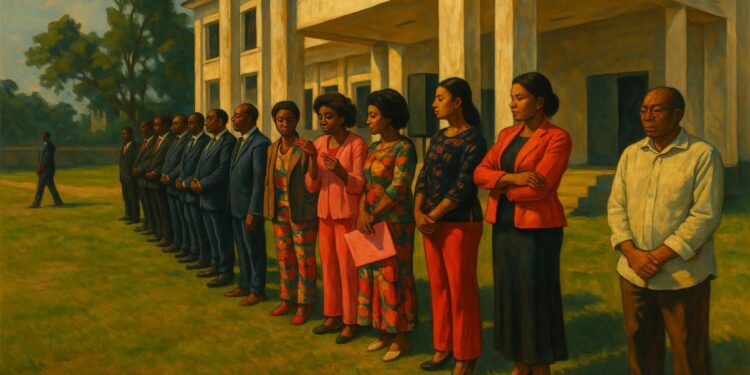A Consistent Presidential Vision
When Prefect Jean Pascal Koumba reminded civil servants in Impfondo that “service to the Republic admits no absenteeism”, he echoed President Denis Sassou Nguesso’s oft-repeated axiom that development begins with disciplined administration. Since the promulgation of the National Development Plan 2022-2026, the presidency has positioned efficiency in public service as the cornerstone of territorial equity. Likouala, a forested department bordering the Central African Republic and the Democratic Republic of Congo, is both symbol and laboratory: remote enough to expose logistical fragilities, strategic enough to merit sustained investment.
Civil Service Discipline Revisited
The prefect’s admonition, delivered during the ceremonial flag-raising, was prompted by what he described as “a worrying culture of semi-permanent vacancy” among certain departmental directors. His language was firm yet measured: no threat of sanction was announced, but the moral appeal was unmistakable. Senior officials in Brazzaville note that absenteeism can absorb up to 18 percent of departmental payroll without a commensurate return in service delivery (Ministry of Public Service, 2023). By publicly foregrounding attendance, the administration signals that performance audits may soon move from spreadsheets to field implementation.
Chinese Engineering, Congolese Oversight
The Likouala development docket is neither aspirational nor abstract. Work is slated to resume on the Impfondo sports complex, entrusted to a Chinese contractor whose on-site managers insist the project can be delivered within eighteen months once dry-season logistics stabilise. Parallel ventures include the Dongou–Impfondo–Épena corridor, the Sambala and Bissambi bridges over the Motaba and Ibenga rivers, and the expansion of the general hospital. These schemes form part of a US$550 million envelope of Sino-Congolese cooperation ratified in 2019 (Economic Commission of Central Africa, 2021). Koumba’s reminder of administrative presence therefore speaks to a practical imperative: international partners require host-government interlocutors who are physically available to validate invoices, customs clearances and environmental safeguards.
Socio-Economic Stakes for a Frontier Territory
Likouala’s demographic profile—just over 300,000 inhabitants scattered across 66,000 km²—makes each kilometre of asphalt disproportionally valuable. A rehabilitated Dongou-Impfondo road could cut timber-to-port transit time by 40 percent, according to a regional study financed by the African Development Bank (2022). Improved medical infrastructure aims to reduce the department’s maternal mortality ratio, currently 70 percent above the national average. For local populations, the prefect’s discourse on discipline is less an administrative sermon than a precondition for tangible gains in transport costs, hospital beds and market access.
A Delicate Diplomatic Subtext
Observers in Brazzaville note that Paris, Beijing and Washington each follow Likouala’s trajectory for different reasons. France’s Agence Française de Développement prioritises biodiversity; China views the department as a node in its Belt and Road corridors; the United States frames governance reforms as part of its Millennium Challenge dialogues. By invoking punctuality and presence, the Congolese government reassures varied partners that oversight mechanisms will not be hollow. A senior diplomat accredited in the capital, requesting anonymity, described the prefect’s message as “a soft compliance memorandum addressed to donors without naming them”.
From Symbolism to Institutional Culture
Skeptics may argue that flag-raising ceremonies cannot alone undo decades of structural absenteeism. Yet precedent suggests symbolic gestures can recalibrate norms. The 2016 enforcement of biometric payroll in Brazzaville reduced phantom staffing by 11 percent within a year (World Bank, 2018). Likouala’s initiative appears calibrated to replicate that success, adapted to the unique geography of riverine prefectures accessible mainly by pirogue or charter flight. Should departmental directors heed the call, the administration will gain immediate human capital for supervising construction sites and supervising social services.
Looking Ahead
Jean Pascal Koumba’s exhortation thus resonates beyond the courtyard of the Impfondo prefecture. It encapsulates the Congolese state’s broader wager that disciplined governance can accelerate frontier development without undermining sovereignty or strategic partnerships. Whether the pledge of assiduity translates into continuous presence at remote outposts will be measurable within months, as work crews mobilise on the Dongou road and procurement files circulate between ministries. For now, the flag still rises at dawn in Likouala, unfurling both a national emblem and an administrative challenge.












































